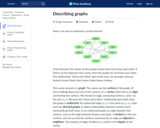
Explore how we have hidden secret messages through history.
- Subject:
- Algorithms
- Computer Science
- Material Type:
- Lesson
- Provider:
- Khan Academy
- Author:
- Sal Khan
- Date Added:
- 04/14/2016

Explore how we have hidden secret messages through history.

Explore the history of communication from signal fires to the Information Age

Learn how to use asymptotic analysis to describe the efficiency of an algorithm, and how to use asymptotic notation (Big O, Big-Theta, and Big-Omega) to more precisely describe the efficiency.

Learn about binary search, a way to efficiently search an array of items by halving the search space each time.

Learn how to traverse a graph using breadth-first-search to find a particular node or to make sure you've visited all the notes, traversing one layer at a time.

Assess your understanding of the code breaking presented in the ancient cryptography lesson. This series of articles and exercises will prepare you for the upcoming challenge!

Ready to try your hand at real-world code breaking? This adventure contains a beginner, intermediate and super-advanced level. See how far you can go!

Ideas of how you could continue your learning journey in algorithms.

Learn how to describe graphs, with their edges, vertices, and weights, and see different ways to store graph data, with edge lists, adjacency matrices, and adjacency lists.

The Internet is part of nearly everything we do on a daily basis. But do you know how it all works? From WiFi to IP addresses to HTML to keeping information safe online, there's a lot of important stuff going on that most of us don't have the opportunity to learn more about. In six short, introductory videos, you'll get an inside look into foundational concepts of everything from wires to websites, taught by guest lecturers including the actual "Father of the Internet" Vint Cerf, Tumblr founder David Karp, and creators on teams at Google, Spotify, XBox, Symantec, and more.

Learn insertion sort, another simple but not very efficient way to sort an array of values.

What are algorithms and why should you care? We'll start with an overview of algorithms and then discuss two games that you could use an algorithm to solve more efficiently - the number guessing game and a route-finding game.

Learn merge sort, a more efficient sorting algorithm that relies heavily on the power of recursion to repeatedly sort and merge sub-arrays.

A new problem emerges in the 20th century. What happens if Alice and Bob can never meet to share a key in the first place?

Information Theory in the 20th Century

This is a system of arithmetic for integers. These lessons provide a foundation for the mathematics presented in the Modern Cryptography tutorial.

Why do primes make some problems fundamentally hard? To find out we need to explore primality tests in more detail.

Learn quick sort, another efficient sorting algorithm that uses recursion to more quickly sort an array of values.

Would access to coin flips speed up a primality test? How would this work?

Learn the concept of recursion, a technique that is often used in algorithms. See how to use recursion to calculate factorial and powers of a number, plus to generate art.